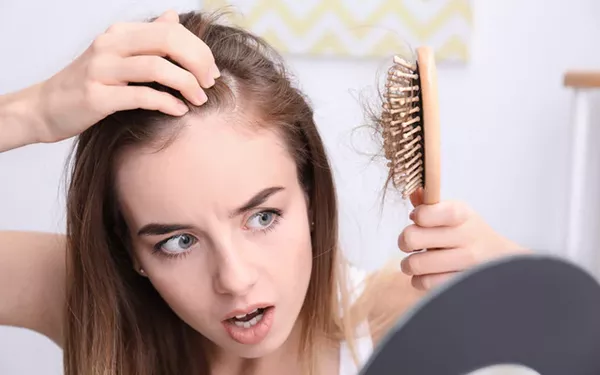Hair loss is a common concern that affects individuals of all genders and ages. While shedding a few strands every day is considered normal, the magic number that defines “normal” has long been debated. Some claim that losing 100 strands daily is within the realm of acceptability, but is that truly the case? In this article, we dive deep into the world of hair loss and aim to uncover the truth behind this puzzling phenomenon.
Understanding the Hair Growth Cycle:
To comprehend hair loss, it’s crucial to grasp the hair growth cycle. Our scalp is adorned with millions of hair follicles, each going through three stages: anagen (growth phase), catagen (transitional phase), and telogen (resting phase). During the telogen phase, hair naturally falls out to make way for new growth. On average, individuals have approximately 100,000 to 150,000 strands of hair on their heads.
Debunking the Myth of 100 Strands:
Contrary to popular belief, losing 100 strands of hair each day isn’t necessarily a definitive marker of normal hair loss. In fact, the amount of hair shed can vary significantly among individuals. Factors such as genetics, age, hormonal changes, lifestyle, and underlying medical conditions play a significant role in determining the extent of hair loss.
What Constitutes Normal Hair Shedding?
Experts suggest that losing around 50 to 100 strands of hair daily falls within the normal range. However, it’s crucial to pay attention to the context of hair loss. If you notice sudden, excessive shedding or a noticeable thinning of your hair, it might be indicative of an underlying issue that warrants further investigation.
Differentiating Between Hair Loss and Hair Breakage:
While hair loss refers to the shedding of hair from the root, hair breakage occurs when the hair shaft snaps or fractures. It’s important to distinguish between the two as the causes and treatments may differ significantly. Excessive hair breakage can be caused by heat styling, harsh chemical treatments, over-brushing, or using improper hair accessories.
Identifying Potential Causes of Hair Loss:
Various factors can contribute to hair loss beyond the natural shedding process. Some common causes include:
a. Hormonal Imbalances: Fluctuations in hormones, such as during pregnancy, menopause, or thyroid disorders, can trigger hair loss.
b. Nutritional Deficiencies: Inadequate intake of essential nutrients like iron, zinc, biotin, and vitamins A, C, and D can adversely affect hair health.
c. Medical Conditions: Certain medical conditions like alopecia areata, scalp infections, and autoimmune disorders can lead to hair loss.
d. Stress and Emotional Factors: Chronic stress, anxiety, and emotional trauma can disrupt the hair growth cycle, leading to increased hair shedding.
Seeking Professional Help:
If you are concerned about excessive hair loss or noticeable thinning, consulting a healthcare professional or a dermatologist specializing in hair disorders is highly recommended. They can conduct a thorough evaluation, diagnose the underlying cause, and recommend appropriate treatment options.
Promoting Healthy Hair:
While some forms of hair loss may be unavoidable, there are several proactive steps you can take to promote hair health:
a. Maintain a Balanced Diet: Ensure your diet is rich in essential nutrients, including proteins, vitamins, and minerals, to support healthy hair growth.
b. Gentle Hair Care: Avoid excessive heat styling, harsh chemicals, and tight hairstyles that can strain and damage your hair.
c. Stress Management: Incorporate stress reduction techniques like exercise, meditation, and adequate sleep to support overall well-being and healthy hair growth.
Exploring Treatment Options:
In cases where hair loss is a result of an underlying medical condition, specific treatments may be necessary. Dermatologists may recommend medications, topical treatments, or even hair transplant procedures depending on the diagnosis. It’s essential to follow the guidance of a medical professional to address the root cause effectively.
The Psychological Impact of Hair Loss:
Hair loss can have a significant emotional and psychological impact on individuals. Society often places great importance on hair as a symbol of beauty and youth, leading to feelings of self-consciousness and decreased self-esteem. It’s essential to address these concerns by seeking support from loved ones, joining support groups, or seeking professional counseling if necessary.
Embracing Hair Loss:
For those experiencing significant hair loss, embracing their natural appearance can be empowering. Many individuals opt for alternative hairstyles, such as shorter cuts or shaved heads, to embrace their unique beauty. It’s essential to remember that beauty extends far beyond physical appearance and that self-confidence comes from within.
Conclusion:
While the notion of losing 100 strands of hair daily as normal has circulated for years, it is not a universally accurate benchmark. Hair loss can vary greatly among individuals, and factors such as genetics, lifestyle, and underlying conditions contribute to the extent of shedding. Recognizing the difference between normal hair shedding and excessive hair loss is crucial in identifying potential underlying causes and seeking appropriate treatment. Remember, maintaining a healthy lifestyle, seeking professional advice when needed, and embracing your unique beauty are essential steps towards navigating the maze of hair loss with confidence.

